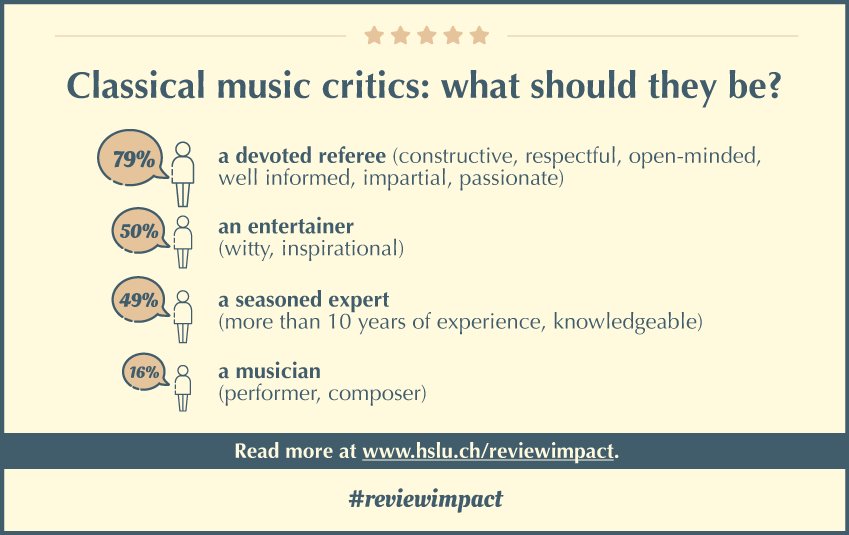
Do reviews matter?
FOLLOW THIS LINK TO TAKE PART IN A STUDY ON THE IMPACTS OF REVIEWS
In 2018 the Guardian newspaper (UK) ended its contract with Lyn Gardner, its theatre critic of 23 years, and the ‘last reliable mainstream chronicler of contemporary British theatre’. The newspaper wrote:
Cultural criticism in its traditional form is dying. It is being replaced by something entirely different: the internet phenomenon known as “fandom”.

For many, this event symbolised a worrying trend; the disappearance of professional arts criticism from mainstream media. This was blamed on the influx of peer to peer and non-professional reviews in the online realm. Online word of mouth (OWOM) exists for just about every consumer product and experience, including the music market.
Professional music criticism has weathered countless storms in the last two centuries, but OWOM may be its biggest challenge.
Critical reactions to music can be found back as far as the writings of Plato and then medieval music theorists. The modern version of music review, following a performance, began in the eighteenth century in Europe, thanks to the increasing popularity and accessibility of concerts.
To begin with, music reviews focused on the evaluation of the work being performed and the composer, but as public performances increased so did references to the achievements of individual performers, in particular vocalists.

In the modern world, professional music criticism has evolved into writing that encompasses evaluation, description, elucidation, classification, contextualisation, interpretation, and/or analysis of both live and recorded performances (Carroll, 2009, pp. 13–14).
As well as the detail of the music itself, it focuses on the experience of listening to a recording.
Amanda Petrusich, American music journalist, teacher of music criticism at New York University and staff writer at The New Yorker, wrote; ‘It is important that a critic know some things about music … But writers also need to know what they think about a record—how it moves them’ (2016).
OWOM by comparison, rarely contains the depth, breadth or context of a professional review. There is also a risk that OWOM can be artificially generated, or ‘fake’ (Murdock, 2019). Even if it is genuine, OWOM may be limited to a small collection of words and a star rating… does that matter?
Are we as influenced by the passing judgment of a faceless online consumer as we are by a professionally trained critic?

We don’t know the answer to this question. No studies to date have compared OWOM presentation to professional criticism.
The inklings from the literature are that people still seek out, respect, and enjoy professional critique. Alessandri et al’s., (2020) study of classical music listeners confirmed that over two thirds read professional reviews. What is more, they had a clear idea of what a good review should contain and the characteristics of an influential professional reviewer. Click here to view the infographic summary of this project.

For more results, see the link above
Professional criticism of music, or any subjective experience, may be seen as a dying art by some commentators, but our research tells us that it continues to hold a position of respect and influence for music listeners.
Professional critics are part of an active community with a unique viewpoint and position in the modern music market. As researchers we want to understand the impacts of professional criticism and clarify what it takes to create a great review.
Our latest study is the first active online test of review influence. And you can have your say! To take part all you need to do is answer a few questions about yourself, read 4 reviews of either music or food (our all important control group) and rate them on scales of impact.
Our survey is open to everyone! Worldwide, all ages, we have no restrictions. You don’t have to be a musician or an expert in review. As long as you are confident reading written English (of the level of a newspaper article) then we would love to hear from you.
As a thank you for taking part we offer you the chance to win one of 10 Amazon vouchers worth 50 Euros (or the closest upwardly rounded figure in your chosen Amazon denomination). There is no obligation but if you do choose to enter then your email will only be used for the purpose of the prize draw. We will never share your details with any third party.
The project is run by the Lucerne University of Applied Sciences and Arts (Switzerland) and is funded by the Swiss National Science Foundation. The survey has once again been built in Qualtrics, which meets rigorous international standards for data security.
If you know any individual or groups that might be interested in reviews, we would be most grateful if you could forward the survey link.
FOLLOW THIS LINK TO TAKE PART IN A STUDY ON THE IMPACTS OF REVIEWS
References
Alessandri, Elena (2014). Evaluating recorded performance: An investigation of music criticism through Gramophone reviews of Beethoven piano sonata recordings. Dissertation, Royal College of Music, London, UK.
Alessandri,; Dawn,; Senn,; Szamatulski,; Baldassarre, & Williamson, V (2020). Consumers on Critique: A Survey of Classical Music Listeners’ Engagement with Professional Music Reviews. Music & Science, 3, 1-19. doi: 10.1177/205920432093133
Alessandri, E; Carreras Sandoval, V; Eiholzer, H & Williamon, A (2016). A critical ear: Analysis of value judgements in reviews of Beethoven’s piano sonata recordings. Frontiers in Psychology / Performance Science, 7 (391), 1-17. doi: 10.3389/fpsyg.2016.00391
Alessandri, E; Carreras Sandoval, V; Eiholzer, H & Williamon, A (2015). Beethoven recordings reviewed: A systematic method for mapping the content of music performance critique. Frontiers in Psychology, 6:57. doi: 10.3389/fpsyg.2015.00057
Carroll, N. (2009). On Criticism. New York: Routledge.




